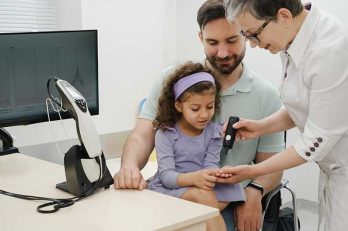As parents, we desire the best for our children, which includes ensuring their health and wellbeing. Vision and hearing are essential components of early childhood development. These senses are essential for a child’s development, communication, and social interactions. Early detection of vision and hearing issues is crucial for providing opportune interventions and improving future outcomes. In this blog, we will discuss the importance of vision and hearing examinations for young children, the significance of early detection, and how these screenings can positively impact a child’s life.
Importance of Vision Examinations
Vision is a fundamental sense that has a substantial impact on a child’s capacity to explore the world, acquire knowledge, and develop essential skills. Pediatricians recommend early vision screening to identify any potential issues that may impede a child’s visual development. Common vision issues, such as refractive errors and weak eye (amblyopia), are not always readily apparent. However, early screening can detect these issues and enable prompt treatment, ensuring optimal visual acuity and preventing further complications, thereby ensuring optimal visual acuity and preventing further complications.
Typically, vision screenings are non-invasive and can be performed on infants. Eye specialists can detect conditions such as strabismus (misalignment of the eyes) and astigmatism through these screenings, allowing for timely intervention and enhancing the likelihood of successful treatment.
The Importance of Hearing Testing
Hearing is another essential sense that has a profound effect on the language and speech development of an infant. Undiagnosed hearing issues can result in speech delay, communication difficulties, and learning difficulties. Early hearing screening can identify potential issues, such as hearing loss, and facilitate early intervention to enhance the auditory development of a child.
Hearing screenings are risk-free and painless, making them appropriate for even neonates. The assessments are designed to detect hearing impairments and ensure that young children receive the appropriate support and therapy.
The Potential Opportunity
The first few years of a child’s existence are crucial for brain development, particularly in terms of vision and hearing. During this period, the neural connections in the brain associated with these senses are rapidly forming, making early detection and intervention even more crucial. By identifying and treating vision and hearing problems in infancy or early childhood, we can maximize the brain’s ability to adapt and overcome obstacles, resulting in improved long-term outcomes.
Superior Academic Results
Vision and hearing problems can have a substantial impact on a child’s academic performance. These issues, if left undiagnosed, may result in learning difficulties, difficulties communicating with instructors and peers, and a lack of interest in educational activities. These issues can be remedied through early detection and intervention, allowing children to fully engage in the learning process and attain their academic potential.
Improved Social and Emotional Health
Vision and hearing are essential for the social and emotional development of a child. Due to their inability to comprehend and communicate with others, children with untreated hearing or vision impairments may experience social isolation, frustration, or even behavioral issues. Detection and intervention at an early stage can enable children to completely participate in social activities, develop healthy relationships, and increase their self-confidence.
Conclusion
Vision and hearing screenings are essential components of early childhood health care. Early detection of prospective problems enables interventions that can have a significant impact on a child’s development, academic performance, and overall well-being. As parents and caregivers, we must prioritize these screenings and collaborate closely with physicians and specialists to give our children the best possible start in life. By embracing early detection, we pave the way for improved outcomes and more promising futures for our children. Together, let’s safeguard their vision, hearing, and health as they embark on their journey of development and discovery.




